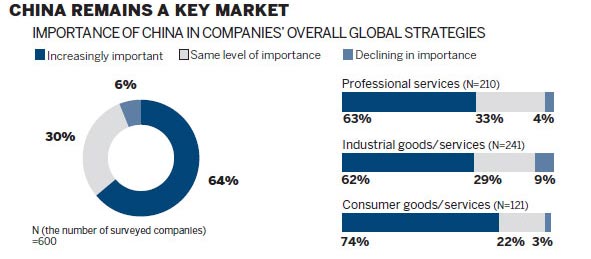It was made easier when Pester realized China was home to 5,000 pharmaceutical companies and the market remained one of the few bright spots for growth during the global economic downturn.
"Nowadays, European markets are largely saturated and have stagnated, which propelled us to look for new areas of growth. The BRICS nations (Brazil, Russia, India, China and South Africa) are definitely where new businesses would take place," he says.
"I would say the market access in China is much easier today compared with 15 years ago when everything was a bit unknown and unexpected. You find yourselves better located, where the number of English speakers has picked up dramatically, and you find flights to China are more frequent than before."
Pester Pac has supplied more than 7,000 film-wrapping, case-packing and palletizing machines to companies around the world, including Colgate-Palmolive Co and Johnson & Johnson Inc.
Pester believes that the tide of investment has now turned in favor of smaller established European companies who, inspired by the success stories in China of their bigger counterparts, have been flexing their muscles on the side, awaiting their turn.
Another German company, Boehringer Ingelheim AG, has spent $46.35 million setting up a joint venture in Shanghai and establishing itself as the first biopharmaceuticals manufacturer in China to use mammalian-cell culture technology.
"The gloomy outlook for the world economy makes China the single-most important emerging market for European small and middle-sized enterprises," says Christian Boehringer, chairman of the shareholders' committee.
The partnership with ZJ Base Co in Shanghai is an important step in Boehringer Ingelheim's strategy to meet the growing demand for high-quality biopharmaceuticals in China, Boehringer says.
"There are some small and middle-sized companies that have developed new medicines but have not come up with a set of matching manufacturing processes," he says. "We help them design ways of mass production, boost efficacy and achieve commercialization, so that their products will be licensed and find ways to market."
As markets become global, an increasing number of European SMEs are turning to exporting their ideas and efforts to other countries, says Chang Xinjie, public relations director at Haldor Topsoe (Beijing) Co Ltd, a Chinese subsidiary of the Danish catalysts producer.

In June, the company announced the purchase of land in Tianjin, North China, for a new plant that it expects to double its annual turnover.
Chang says the move is in line with Haldor Topsoe's strategy of strengthening and expanding cooperation between Denmark and China, with energy efficiency and environmental protection priorities on the Chinese government's agenda.
"In continuously driving toward greener economic growth, the Chinese government needs more and more advanced technology and solutions in agriculture, infrastructure, manufacturing, energy, environment and service sectors," Chang says.
"In these areas, EU SMEs do have something to offer and will be naturally attracted to the Chinese market."
